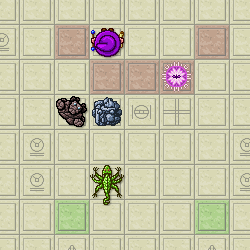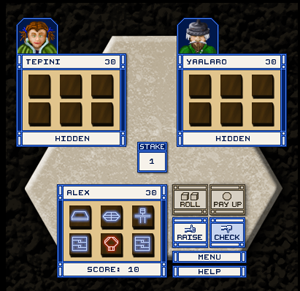Oliver & the Basilisks is my personal favorite of my Flash games. It took a long time to finish precisely because my “testing” sessions often ended up turning into multi-hour marathons as I forgot about bug-hunting or mechanic-tweaking and simply lost myself in pursuing a new high score.
The basic gameplay is derived from the old game of Robots, or its better-known clone, Daleks. The idea is this: on each level, you are facing an ever-increasing number of enemies – in this game, basilisks. You can move one step at a time in any of the eight cardinal or ordinal directions, after which the basilisks will all take a step too, directly towards you. Although you can’t hurt them directly (and will die if caught by them), if two of them collide in pursuing you, they will turn each other to stone. The resulting heap of stone will also remain in place and kill any further basilisks running into it.
In the original Robots (or Daleks), your only options other than moving or passing were to use one of your limited number of sonic screwdrivers, killing all adjacent robots, or to teleport. Teleporting could be done at will, but would put you in a random place, potentially right next to a robot for an immediate loss.
Oliver & the Basilsks retains these two mechanics, in the form of the Teleport and Fire Shield spells, but these are only two of a total of fourteen at your disposal (in the Deluxe game mode, fewer in Simple or Normal). Thus, the tactical options in O&tB are significantly greater.
Additionally, there is an RPG-like progress in power for you, the eponymous hero. In Simple mode, it’s much like Daleks, as you simply acquire additional charges for your Fire Shield wand with each level. In Normal and Deluxe, however, you also earn scrolls, and can switch which spells you’re using for each level, assigning one each to your amulet, wand and scoll slot, each of which works slightly differently. In Deluxe, you also have access to only three spells initially, and must learn the rest by earning and using scrolls.
Finally, there is one additional complication in Normal and Deluxe mode, which is the addition of magic spirits. These appear randomly, and move semi-randomly, but with a bias towards approaching rock piles. If you catch one, it will recharge your wand and amulet… but if it reaches a rock pile instead, the two will merge to form a golem. Golems are very dangerous, as they will smash through basilisks and rock piles unharmed; they are worth many points if you destroy them (and you don’t need to destroy them to beat a level), but the only ways to do so are by collision with another Golem, or the Magic Trap, Lightning or Disintegrate spells.
Thus, Oliver & the Basilisks takes a very classic and elegant mechanic, and adds multiple layers of strategy and tactical freedom on top of it to produce a surprisingly deep and challenging game, while retaining the arcade-like feel. It will likely seem difficult and random at first, but if you stick with it, you’ll find that your high scores increase by leaps and bounds as you learn the tricks.
If you’re stuck, however, I made a couple of strategy videos for Simple and Normal mode, though I never got around to doing one for Deluxe mode.
Oliver & the Basilisks Simple Mode Tutorial
Oliver & the Basilisks Normal Mode Tutorial

